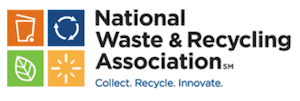
Surface Transportation Infrastructure
NWRA POSITION
NWRA supports increasing road capacity including a forward-looking view to address future needs.
BACKGROUND
Apart from the waste and recycling industry and the U.S. Postal Service, no other industry travels every road in America at least once every week. This makes the waste and recycling industry one of the most significant stakeholders in the surface transportation system.
The National Interstate Highway System was created in 1956 thanks to the vision and leadership of President Eisenhower. The United States population was only around 200 million when the system was built in the 1960s and 1970s, however, more than 310 million people use America’s roads and bridges today – a load far larger than it was originally planned to handle.
Our nation’s roads, bridges, ports and other transportation infrastructure have reached a crisis level that threatens to throttle back our economy and restrict future growth. The highway congestion resulting from this lack of capacity costs the U.S. nearly $80 billion annually in lost productivity and wasted fuel.
Nearly 200,000 miles of major highways require repairs and more than 47,000 bridges are deemed “structurally deficient,” all of which impacts our industry’s ability to deliver its services that are essential to maintaining the quality of American life efficiently and in a timely manner.
President Trump and congressional leaders have advocated investing more than $2 trillion in America’s infrastructure over the coming decade to meet our country’s growing needs. This idea has been met with bipartisan interest spanning the political spectrum from conservative to liberal. While some may call this level of investment ambitious, in reality it will just get the U.S. infrastructure back to the level where it should be, considering the country’s current population and economic activity.
To fund this program, NWRA encourages Congress to work together and with the Trump Administration to develop an “all of the above” approach. Only a diverse set of revenue and financing streams can adequately supply the funding needed both to build new and repair existing infrastructure vital to our nation.
Introduction of “America’s Transportation Infrastructure Act” (ATIA), a five-year (FY ’21-’25), $287 billion bipartisan surface transportation bill is an important first step in addressing our nation’s transportation infrastructure needs. The bill also will authorize new programs to incentivize key priorities including safety, resiliency, and emission reductions. ATIA increases funding to the existing Highway Safety Improvement Program and supports state-led initiatives to lower driver and pedestrian fatalities.
TALKING POINTS
- Members of the waste and recycling industry travel every road in America at least once every week making it one of the most significant stakeholders in the system.
- Congestion and needed road repairs impact our industry’s ability to deliver its services that are essential to maintaining the quality of American life efficiently and in a timely manner.
- NWRA supports safety provisions in surface transportation legislation to support state “Move Over” laws covering the waste and recycling industry.
Updated January 2020.

